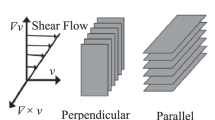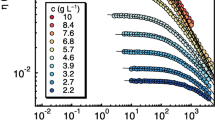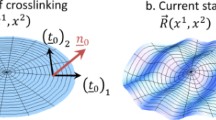Abstract
Analysis of the electrorheological response of thermotropic solutions of a main-chain liquid crystal polymer (MCLCP) in a low molar mass nematic solvent is performed at a fixed shear rate as a function of the applied field strength. The Leslie viscosity coefficient α2 can be obtained by least squares fits to an equation describing the balance between the viscous and electric torques, formulated via the two dimensional Leslie-Ericksen-Parodi theory. We find that the increment Δα2 on dissolving the MCLCP increases linearly with molecular weight, consistent with earlier light scattering measurements of the increment in the twist viscosity, Δγ1, and also with previous electrorheological measurements of the increment in the Miesowicz viscosity Δηc.
Similar content being viewed by others
Author information
Authors and Affiliations
Additional information
Received: 1 December 1998 Accepted: 28 April 1999
Rights and permissions
About this article
Cite this article
Chiang, YC., Jamieson, A. Electrorheological determination of the Leslie viscosity coefficient (α2) of a main-chain liquid crystal polymer in a nematic solvent. Rheol. Acta 38, 268–273 (1999). https://doi.org/10.1007/s003970050178
Issue Date:
DOI: https://doi.org/10.1007/s003970050178




